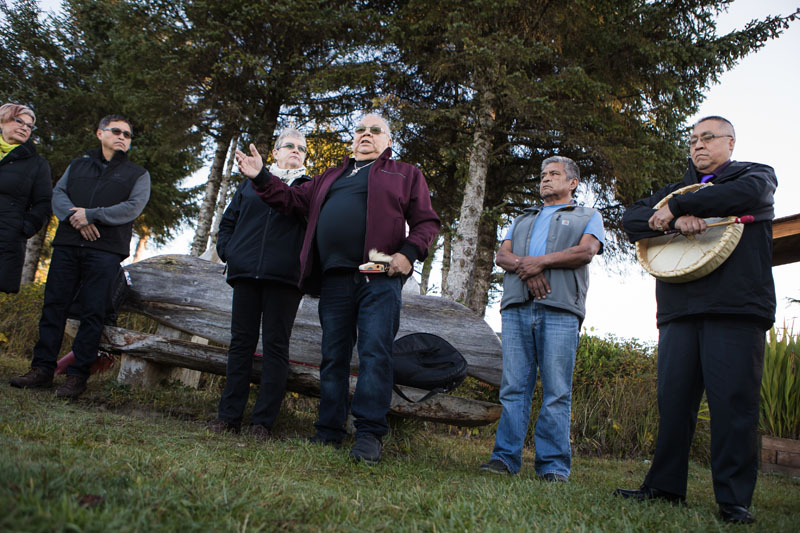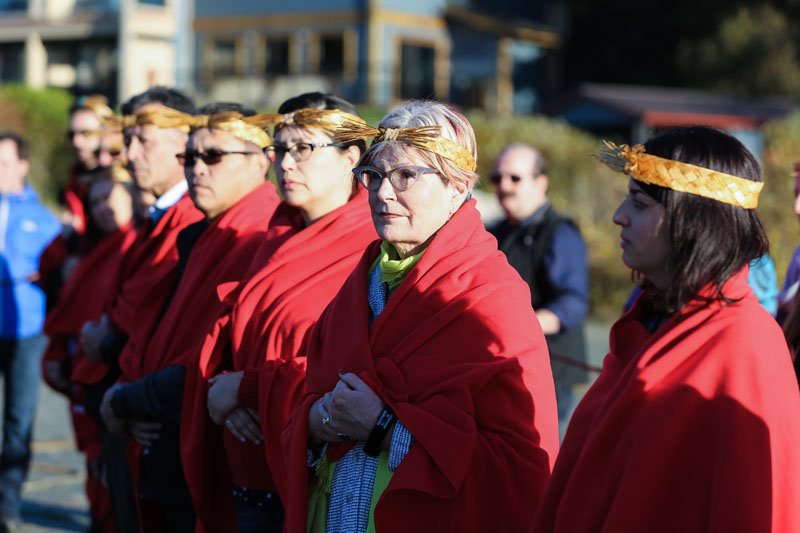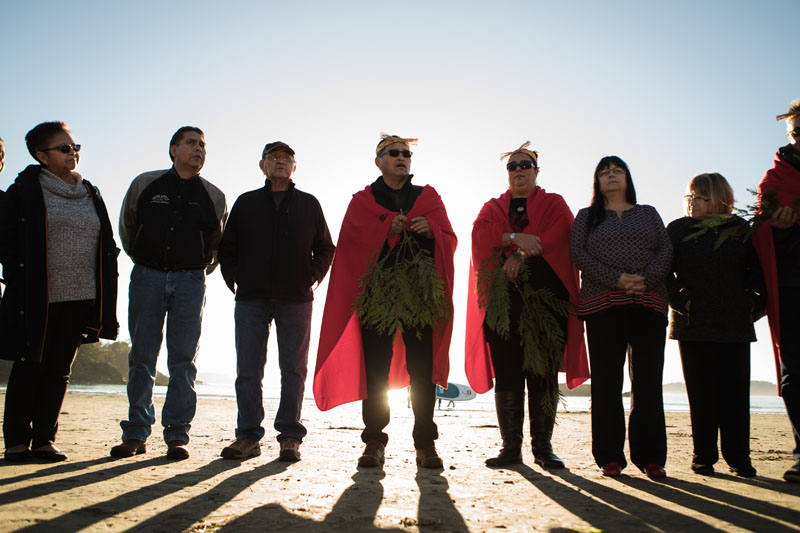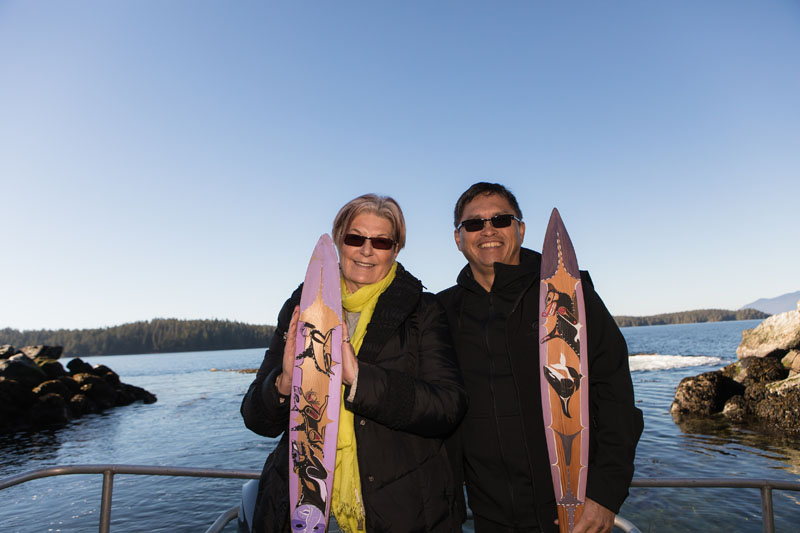NUU-CHAH-NULTH TERRITORY – The First Nations Health Authority (FNHA) hosted a two-day mental health and wellness cultural exchange between Nuu-chah-nulth communities and the Mental Health Commission of Canada on October 26 and 27, 2017.
The Mental Health Commission of Canada (MHCC) is a national organization that develops and influences public policy and seeks to inspire collective action for mental health and wellness of Canadians. Last September, Richard Jock (member of the Mohawk Nation at Akwesasne), Chief Operating Officer, FNHA was appointed to the MHCC board of directors. MHCC representatives were invited to learn from the work currently underway among Island First Nations as well as the FNHA's work in support of mental health and wellness.
Mental health and wellness is a key priority in each one of five FNHA regions and First Nations communities and organizations in B.C. are leading some of the most innovative and culturally-driven initiatives in the country. As a health and wellness partner to all BC First Nations, it is FNHA's job to amplify, enable and build on these foundations.
"Our goal with this exchange was to expose mental health leaders from across Canada to the importance and impacts that our culture has on our wellbeing," explains Brennan Macdonald (Cowichan Tribes), Regional Director for FNHA Vancouver Island Region. "Island Nations' traditional approaches to mental health and wellness are internationally recognized. As the island team, we are pleased to share experiences that build better understanding and appreciation of our perspective on wellness."
Sharing community-driven wellness approaches
Over 30 attendees gathered at Tin-Wis in Tofino, on Tla-o-qui-aht territory. Representatives were welcomed to Tsawin beach by Elder and beach keeper Barney Williams, and Chief Elmer Frank of Tla-o-qui-aht First Nation. Barney shared the sacred story about how his family came to be guardians of this land.

Attendees are welcomed to Tla-o-qui-aht territory by beach keeper Barney Williams
Photo Credit: Melody Charlie.
Each group shared from their work to support mental health and wellness. A vital part of the exchange included presentations by First Nations-led mental health and wellness programs on Vancouver Island. Attendees heard from the KUU-US crisis line, Tsow-Tun Le Lum substance abuse and trauma treatment centre, and the Nuu-chah-nulth Quu'asa program for Residential School survivors and their families. All three programs draw on traditional teachings and ceremonies that have supported health and wellness for thousands of years. As a health and wellness partner to First Nations individuals, families and communities, the FNHA recognizes the value of partnership with community and nation-based programs to support and strengthen the health outcomes of First Nations and indigenous people in BC.
Learning through ceremony
In the afternoon, attendees gathered on the beach again to participate in a klumuxstuq ('warming the heart') ceremony. It was led by Elder Dave Frank (Ahousaht First Nation) and members of Nuu-chah-nulth Tribal Council's Quu'asa team. The team explained that they use this ceremony with residential school survivors and their descendants to support them on their healing journeys.
Helpers laid cedar boughs on the sand, encircled by a strong cedar bark rope. Representatives from FNHA and the Mental Health Commission were blanketed and led down to the beach where they stood on the cedar. Others formed a circle around them and held the cedar rope. Afterwards, the cedar was carried to the ocean.
Stan Matthew (Tla-o-qui-aht First Nation) who is a Teechuktl CHS Training Coordinator with the Nuu-chah-Nulth Tribal Council explained, "We're going to blanket you to give you strength. To warm your heart. And to warm your spirit. When we're done, when we're finished, this is to send you forward with strength and with spirit that will help you when you go do the work that you need to do."

Representatives from the Mental Health Commission of Canada and FNHA are blanketed during a ceremony on Tsawin beach, Tla-o-qui-aht territory
Photo Credit: Melody Charlie
The next day, attendees travelled by boat to Lone Cone Hostel & Campground on Meares Island at the old Matsquiaht Ahousaht village site. Dave Frank and Julia Atleo of Ahousaht First Nation led a hoop ceremony. It was a powerful example of the work being done to reclaim this territory – where the Christie (Kakawis) Residential School stood from 1900 to 1983 – as a healing place.
"When you heal the spirit, your body responds in a positive manner...your body heals. When you have mental issues, emotional issues, you can help them through ceremony," explains Dave. "We have a lot of good gifts that come from western medicine, and through the hoop ceremony you will experience some of our medicine."

Attendees gather in a sharing circle after the klumuxstuq ceremony on Tsawin beach.
Photo Credit: Melody Charlie
Honouring a First Nations perspective
Spending time on traditional territories of BC's First Nations and hearing the stories of the land is a key way for FNHA and our partners to come to understand a First Nations perspective of health and wellness.
"Cultural safety is about shifting the notion that there's only one world view in terms of what health care looks like. It's about recognizing our point of view is not an illness point of view. We look at the whole picture, the whole human being. And that's why we're here, to create a common understanding and a way of moving forward together," said FNHA CEO Joe Gallagher (Tla'amin ancestry).
"It's so hard to put the experience into words, what it meant, its impact. It was intensely meaningful and has expanded my personal learning and understanding and has been an important step in growing our organizational understanding," said Louise Bradley, President and CEO of the MHCC. "This exchange has been, and continues to be, a rich and humbling learning experience."

MHCC CEO, Louise Bradley and FNHA CEO Joe Gallagher were gifted paddles carved by Qaamina Sam (Ahousaht Nation)
Photo Credit: Melody Charlie

